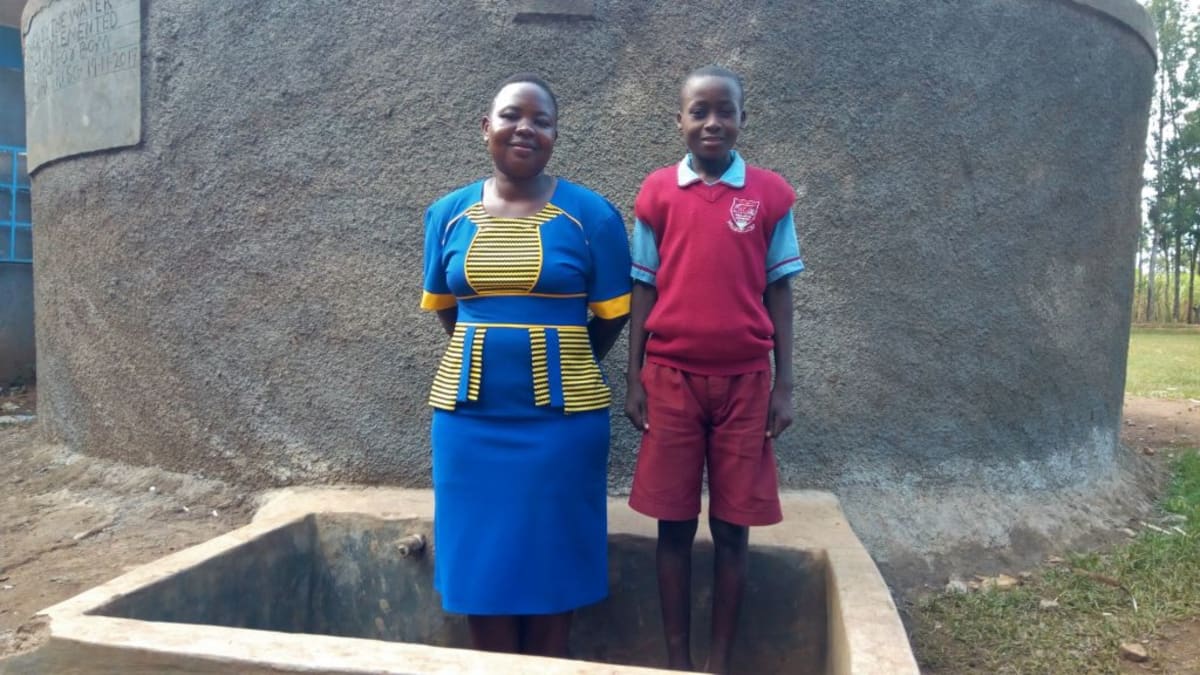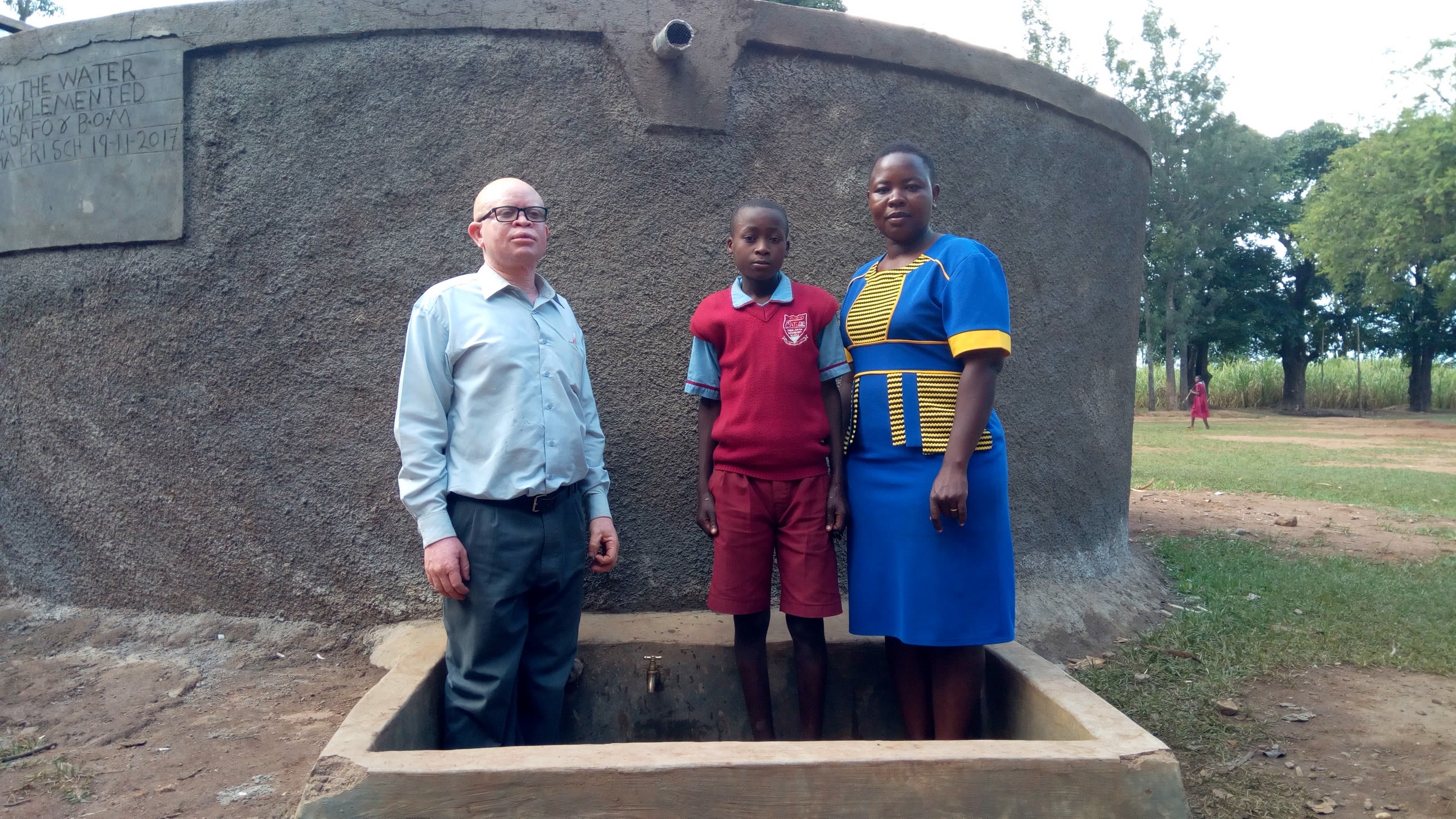This project is a part of our shared program with Western Water And Sanitation Forum (WEWASAFO). Our team is pleased to directly share the below report (edited for clarity, as needed).
Welcome to the School
St. Paul’s Emulakha Primary School was established in 1984, starting with a student population of 220. It is sponsored by the Catholic Church. Presently it has 965 pupils in the primary section. It also has and early childhood section hosting 96 little students. Emulakha employs 18 teachers. The school motto is "Arise and Shine."
(Editor's Note: While this many people may have access on any given day, realistically a single water source can only support a population of 350-500 people. This community would be a good candidate for a second project in the future so adequate water is available. To learn more, click here.)
A normal day starts with getting to school very early in the morning by 6am. Pupils carry water in their small jerrycans of five liters each in order to clean their classrooms. After cleaning, they sit in morning study hall for 30 minutes until teachers arrive for the announcements assembly. Normal lessons begin exactly at 8am and go until lunch. Students are sent home to eat lunch with their families. They come back at 2pm and continue their lessons until game time at 3:45pm. The pupils are dismissed at 5pm.
This school is unique compared to other schools in the area because the headteacher won't allow the pupils to waste time meant for study doing other activities. For example, instead of the pupils going to fetch water during school time, they only carry water from home in the morning and after lunch.
Water Situation
The school has a seasonal well which they share with members of the local community. The well was constructed in the 1980s and now requires major repair work to restore it to its proper working condition. St. Paul’s Emulakha Primary School does not have any source of water on its grounds. Thus, the students are required to carry water from their respective homes. The headteacher is strict about when this should be done; water should be carried every morning, but also again during the lunch break.
These containers of water must be properly rationed throughout the day. Because the water is coming from different villages, it's impossible to guarantee its safety for drinking. Reports of waterborne disease and resulting absences are common among the student body.
Sanitation Situation
The school has a total of 16 VIP latrines, out of which two are for teachers and visitors and 14 are for students. Out of the 16 toilets for the students, six are for boys and 10 for girls. The early education section also shares these facilities with the primary section. The latrines are not nearly enough for such a high population. This results in dirtier latrines and students wasting a lot of time waiting in line. Due to the water shortage, a good number of latrines cannot be cleaned and thus are not used.
There are a total of eight toilets that have been condemned because they lack doors or have compromised, corroded floors. Some of the walls have even broken down. The school has no hand-washing facility for students to use after the latrines, either.
Headteacher Esther Pache shared her worry with us during our visit. "We fear that the toilets will cave in at the onset of the rains because of the loose nature of the soil. I pray that you complete the project on time so that we can save the lives of our children!"
Plans: Hygiene and Sanitation Training and Hand-Washing Stations
Training will be held for two days. The facilitator will use PHAST (participatory hygiene and sanitation transformation), ABCD (asset-based community development), CTC (child to child), lectures, group discussions, and handouts to teach health topics and ways to promote good practices within the school. The CTC method will prepare students to lead other students into healthy habits, as well as kickstart a CTC club for the school. This CTC club will oversee the new facilities, such as hand-washing stations, and make sure they are kept clean and in working condition. The two hand-washing stations will be delivered to the school, and the club will fill them with water on a daily basis and make sure there is always a cleaning agent such as soap or ash.
Plans: VIP Latrines
Two triple-door latrines will be constructed with local materials that the school will help gather. Three doors will serve the girls while the other three serve the boys. And with a new source of water on school grounds, students and staff should have enough to keep these new latrines clean.
Plans: Rainwater Catchment Tank
A 50,000-liter rainwater catchment tank will help alleviate the water crisis at this school. The school will also help gather the needed materials such as sand, rocks, and water from the spring for mixing cement (students have already started helping). Once finished, this tank can begin catching rainfall that will be used by the school’s students and staff. Students will no longer be responsible to find enough water to carry to school every day.
We and the school strongly believe that with this assistance, standards will significantly improve. These higher standards will translate to better academic performance!

 Rainwater Catchment
Rainwater Catchment
 Rehabilitation Project
Rehabilitation Project

































